Chews To Quit: 3 Tips To Stop Chewing On Your Mouthguard

Do you have a gum chewing habit? Do you bite your nails? Do you grind your teeth while you sleep?
If you answered yes to any of those questions, chances are you also chew on your mouthguard while you’re playing sports. While chewing gum during athletics is largely believed to increase brain activity — as the act of chewing actually improves various bodily functions — chewing on your mouthguard is only hurting your mouthguard.
Here are three helpful tips to get you to stop chewing on your mouthguard:
1. Get Fit
In order to get the most protection and comfort out of your mouthguard, it simply needs to be worn properly. And that all starts with the fit.
Everyone’s mouth is different, so it’s important to be sure that you’re getting a mouthguard that’s been designed taking into account the individual structure of your mouth. Your guard must have a tight enough fit to firmly stay on your upper teeth without being held in place with the lower jaw.
When a mouthguard fits snuggly it stays in place during any impact and won’t become dislodged. It should never be able to come loose and float around your mouth and you should only be able to remove it by pulling it out with your fingers.
That certainly means no “fish hooking” or letting the mouthguard hang out of your mouth, as it forces you to chew on it to keep it in place. Speaking of fish hooking…
2. Strapless Is In
While the strap attachment helps with compliance because it shows you’re wearing your mouthguard, it doesn’t mean you’re wearing your mouthguards properly. And actually, in most cases, the strap attachment prevents you from doing so.
A Great Price
With six different styles to choose from, there is a perfect Gladiator waiting to lead you into battle starting at $45.
Because the strap attachment gives the mouthguard an anchor point, it provides you with the opportunity to more easily “fish hook” your mouthguard and chew on it.
Not only is this promoting improper usage of a mouthguard — as mouthguards should never be hooked in the corner of an athlete’s mouth — but constant chewing also diminishes the protective qualities of the mouthguard.
3. Material Matters
As mouthguards continue to advance, the materials they are composed of continue to change as well. Gone are the days of boiling-and-biting a big chunk of rubber as mouthguards are now produced using state-of-the-art materials.
That means you’re getting mouthguards that are much more durable, which is important, especially if you chew on your mouthguard. Chewing leads to rips and tears in the guard, and rips and tears have the ability to cause gum and tissue irritation, which in time may become infected.
And more durable material means denser material, not thicker. The denser material provides more resistance to chewers, keeping the guard safe without sacrificing any comfort.




 Do you have a gum chewing habit? Do you bite your nails? Do you grind your teeth while you sleep?
Do you have a gum chewing habit? Do you bite your nails? Do you grind your teeth while you sleep? 
